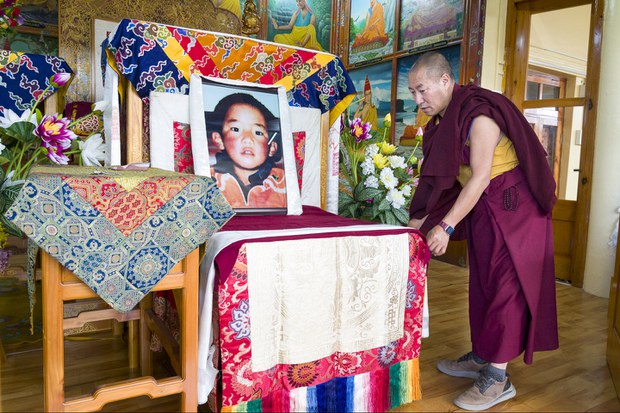Global leaders joined Tibetans across the world this week to mark the 35th birthday of a revered Tibetan religious leader taken into custody 29 years ago and missing ever since.
Gedhun Choekyi Nyima, then just six years old, was recognized by Tibetan spiritual leader, the Dalai Lama, as the 11th Panchen Lama, Tibet’s second most-senior Buddhist monk, in May 1995.
Shortly after the Dalai Lama’s announcement, Chinese authorities abducted the new Panchen Lama, his family and his teacher. His whereabouts remain unknown. If alive, he would have turned 35 on Thursday.
At a commemoration event in Dharamsala, India, Sikyong Penpa Tsering, the democratically elected head of the Tibetan government-in-exile, reissued a long-standing plea for information about his fate.
“Our most pressing concern is whether the Panchen Rinpoche is still alive or not,” Tsering said, using a name Tibetan Buddhists reserve for reincarnated lamas
he Panchen Lama’s abduction illustrates the sensitivity of Chinese authorities to other prominent figures and their effort to control Tibetans by suppressing expressions of their Buddhist faith.
After the 1950-51 Chinese invasion and annexation of Tibet, Beijing made efforts to influence Tibetan affairs, including through the selection of a spiritual successor to the 10th Panchen Lama, who died in 1989.
Tibetan Buddhists believe that the Dalai Lama and Panchen Lama are reincarnated as children when they die, and that they have the right to select the religious leaders based on their religious belief in the principle of rebirth.
After abducting Gedhun Choekyi Nyima, the ruling Chinese Communist Party installed another boy, GyaltsenNorbu, called Gyaincain Norbu in Chinese, as the 11th Panchen Lama.
However, the Chinese government-appointed religious figure remains unpopular with Tibetans both in exile and at home and is perceived as a “political tool” for Beijing.
The fight over the 11th Panchen Lama is likely a precursor to the battle over who will follow the 14th Dalai Lama, who is now 88 years old. China, always wary of opposition to its authority, particularly in the sometimes restive Tibetan region, says it can appoint the successor under Chinese law.
Sikyong Tsering also called on the Beijing-appointed Panchen Lama to “not become a political tool of the Chinese government’s sinister motives.”
“Instead, he must recognize the unprecedented danger threatening the survival of the Tibetan people and Tibetan Buddhism, and fearlessly undertake his responsibility, and not commit any act that would hurt the Tibetans and Tibet’s spiritual and political cause,” he said.
Traditionally the Panchen Lama has played a leading role in Tibetan Buddhist scholarship as the leader of the Tashi Lhunpo Monastery in Shigatse, the second-largest city in Tibet, which has been controlled by China since 1951. The previous incarnation of the Panchen Lama passed away in 1989 at the monastery.
International criticism
Uzra Zeya, special coordinator for Tibetan issues in the U.S. State Department, marked the Panchen Lama’s birthday by calling on China to provide proof of his whereabouts and well-being.
The U.S. government “reaffirms our support for Tibetans to select, educate and venerate their religious leaders free of government interference,” she wrote on X, the social media platform formerly known as Twitter.
A U.S. State Department spokesperson told RFA that Secretary of State Antony Blinken, who is on a visit to China, is expected to “raise clearly and candidly our concerns on human rights, including the ongoing genocide and crimes against humanity in Xinjiang, and abuses throughout the country, including in Hong Kong and Tibet.”

